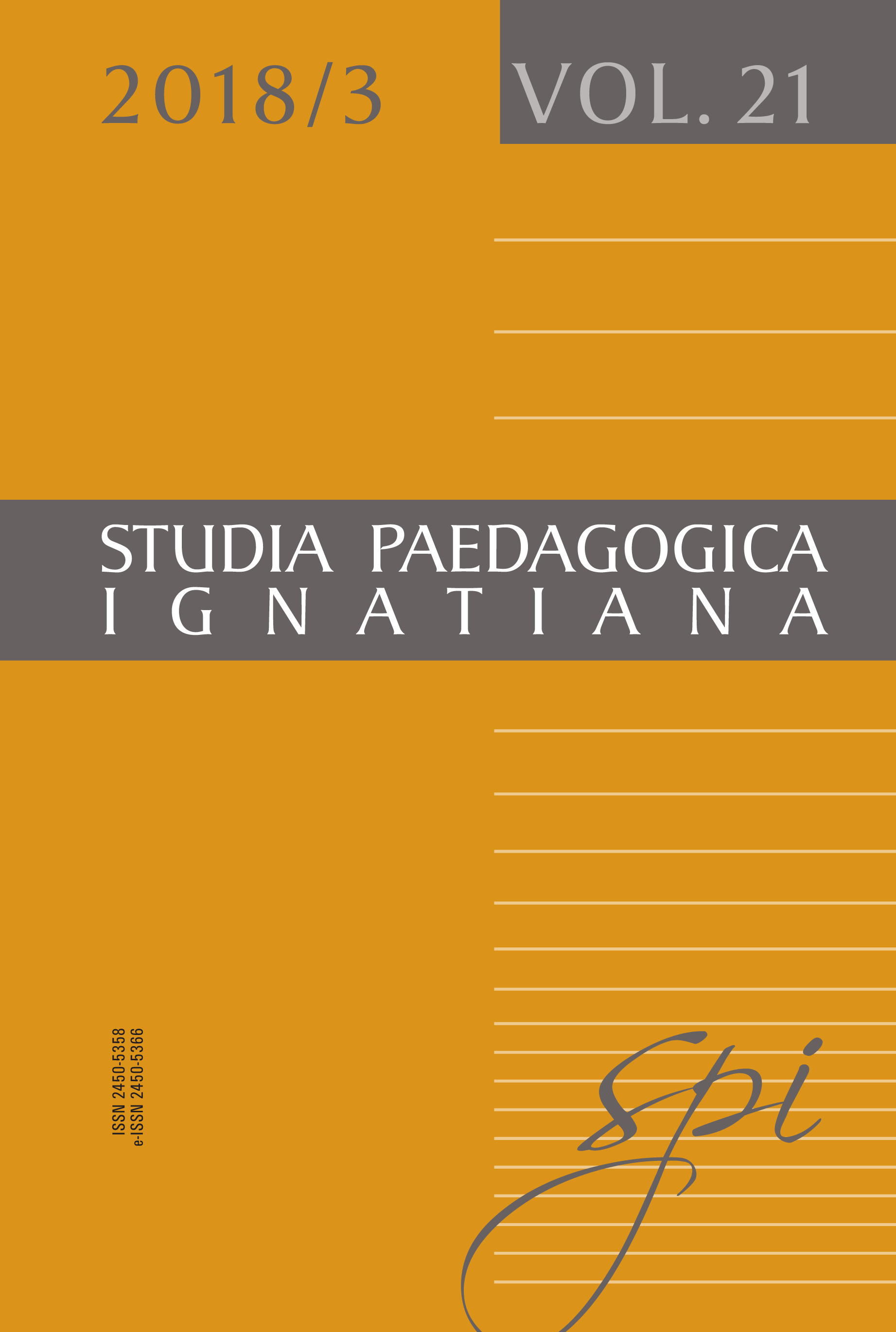Bilingual Education of Future Social Pedagogues as a Guarantee of Their Professional Mobility
DOI:
https://doi.org/10.12775/SPI.2018.002Keywords
bilingual education, bilingual professional competence, educational process, professional mobility, pedagoguesAbstract
In this article the bilingual education of future social pedagogues is presented. It is based on general and special educational principles, general didactic and innovative forms of training, the latest and classical teaching methods, using specific means of training, including the goals and objectives of bilingual education. According to this notion, training occurs in four stages: covering stage (I–IV semesters of studying), additional stage (V–VIII semesters of studying), parity stage (I–II semesters of master’s degree), evolutionary stage (III semester of master’s degree). To each of these stages, special educational and methodological materials have been developed to provide a specific process of bilingual education at the appropriate stages, which forms a training complex for the implementation of bilingual training of future specialists, which corresponds to the educational program of training specialists in the social sphere and covers all types of educational activities of students in the context of bilingual education. It should be noted that this technology has been tested at the Zhytomyr Ivan Franko State University for eight years and has given positive results, especially in terms of the motivational component of the training. In the article it is demonstrated that bilingual education is a guarantee of the professional mobility of future social sphere specialists since this kind of training enables our graduates to be competitive in the modern labor market and to work in any part of Europe and not only in their own country.
References
Baetens Beardsmore H., “The Multilingual School For Mixed Populations: A Case Study,” in: Bilingualism in Education: Theory and Practice, ed. H. Baetens Beardsmore, Vrije Universiteit, Brussels 1990, pp. 1–51.
Bloomfield L., The Language, Progress Publ., Moscow 1968.
Bondaletov V.D., Social Linguistics, Enlightenment Publ., Moscow 1987.
Bredella L., “Towards a Pedagogy of Intercultural Understanding,” American Studies 1992, vol. 37, no. 4, pp. 559–594.
Brinton D.M., Snow M.A., Wesche M.B., Content-Based Second Language Instruction, Newbury House Publ., New York 1989.
Brown G., Principles of Language Learning and Teaching, San Francisco State University, San Francisco (CA) 1987.
Duszak A., Tekst, dyskurs, komunikacja międzykulturowa, Wydawnictwo Naukowe PWN, Warszawa 1998.
Imedadze N.V., Experimental-Psychological Studies of Mastering and Possession of the Second Language, Metsnireba Publ., Tbilisi 1979.
Kanyuk O.L., Formation of Skills of Foreign-Language Business Communication of Future Social Workers in the Process of Professional Training (PhD thesis), Ternopil 2009.
Kokkota V.A., Linguodidactical Testing, High School Publ., Moscow 1989.
Kovalchuk A.O., Gusak A.M., Non-equilibrium Thermodynamics and Physical Kinetics (Part 1. Bilingual course): Tutorial, Cherkasy ChSU Publ., Cherkasy 2010.
Mackey W.F., “A Description of Bilingualism,” in: Reading in the Sociology of Language, ed. J.A. Fishman, Mouton, The Hague 1977, pp. 554–584.
Musin I.Kh., Sociolinguistic Aspects of Speech Behavior in the Context of Bilingualism (PhD thesis), Moscow 1990.
Mykytenko N.O., Theory and Technology of Formation the Foreign Language Professional Competence of Future Specialists in Natural Sciences (Doc. of Science thesis), Ternopil 2011.
Shaydarova N.A., “Development of Bicultural Professional Competence of Students in Conditions of Artificial Bilingualism,” Bulletin of Novgorod State University 2008, no. 45, pp. 72–75.
Shirin A.G., “Didactic and Methodological Aspects of the Process of Bilingual Education,” Bulletin of the Novgorod State University 2005, no. 31, pp. 63–66.
Shubin S.V., Motivation to Master a Foreign Language in the Conditions of Bilingual Education in the Eniversity (PhD thesis), Novgorod 2000.
Sytnyakivska S.M., “The Main Principles of Bilingual Training of Future Social Sphere Experts,” The New Learning Technologies: Science-Method 2016, no. 89, part 1, pp. 208–215.
Vityatnyev M.M., On Methods of Teaching Languages, MSU Publ., Moscow 1971.
Weinrayh U., Monolingualism and Multilingualism, vol. 3, Progress Publ., Moscow 1999, pp. 7–42.
Zaitseva I.V., Motivation of Students Training, Department of the ADPS of Ukraine, Irpin 2000.
Downloads
Published
How to Cite
Issue
Section
License
By submitting an article, the author declares that:
they are the author of the article (hereinafter referred to as the Work) and:
- is entitled to exclusive and unlimited copyright to the Work,
- is entitled to dispose of the copyrights to the Work.
The Author grants the Jesuit University Ignatianum in Cracow a free, non-exclusive, territorially unlimited license to use the Work in the following fields of exploitation:
- publishing the Work in paper, digital or magnetic form;
- multiplying the work by any method, without limiting the number of editions or copies;
- distribution of the work and its copies in any form, including marketing, sales, lending, and lease;
- placing the work in a computer memory;
- distribution of the work in information networks, including the Internet;
- public performance, exhibition, display, reproduction, broadcasting and re-broadcasting, as well as making the Work available to the public in such a manner that everyone could have access to it at a time and place chosen by themselves;
- within the scope of dependent rights to the Work, covering, in particular, the right to make necessary changes to the Work, resulting from editorial and methodical preparation, as well as to make translations of the Work into other languages.
The license right shall be transferred the moment of transfer of the Work to the Jesuit University Ignatianum in Cracow. The Jesuit University Ignatianum in Cracow is entitled to grant sub-licenses to the Work in terms of the right granted. The license shall be limited in time for a period of 15 years from the date it is granted.
Stats
Number of views and downloads: 526
Number of citations: 0



